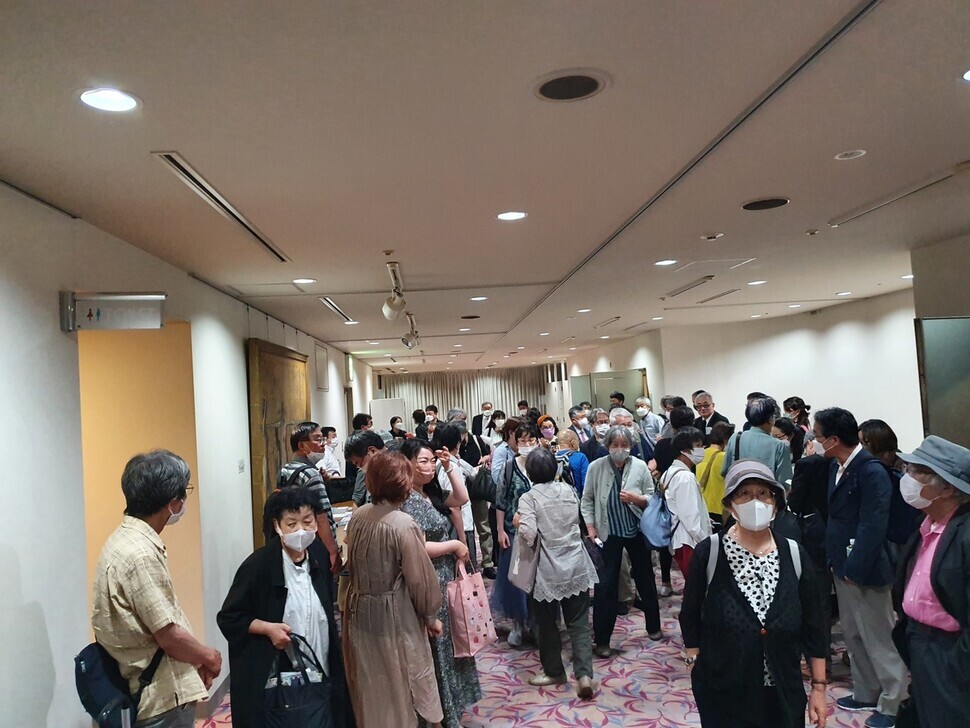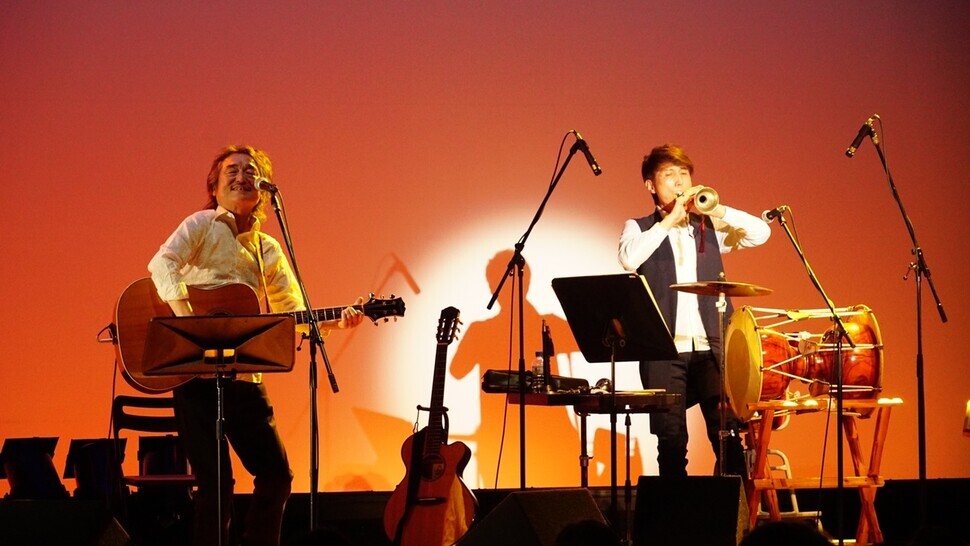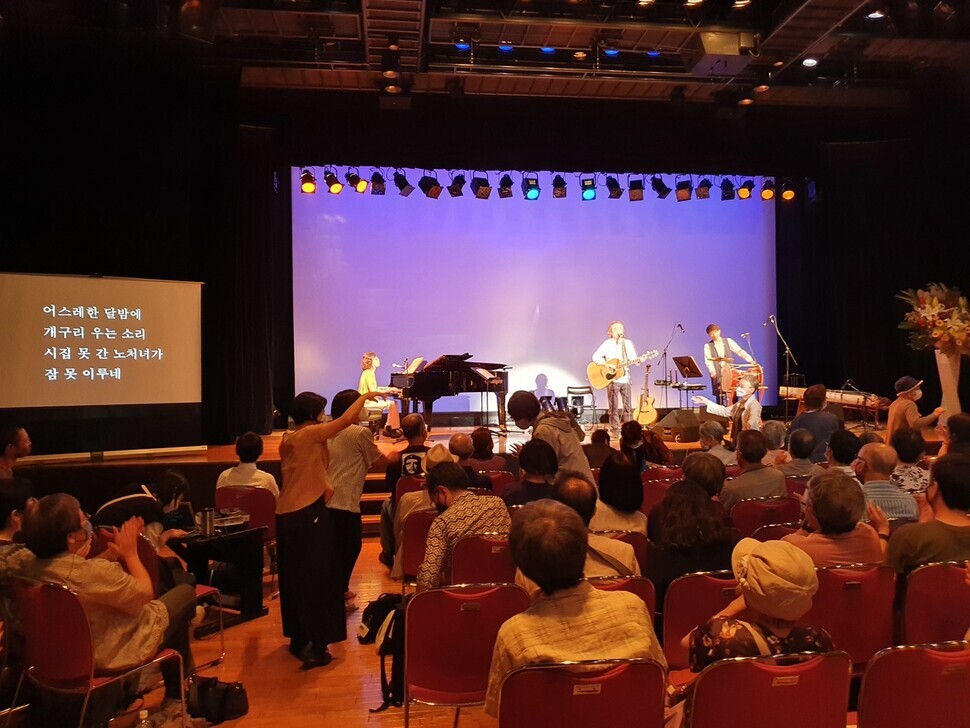hankyoreh
Links to other country sites 다른 나라 사이트 링크
Japanese event commemorating Jeju April 3 Incident draws hundreds

“Who was it who said to kill the islanders? The times were like madness. Fished out from the sea, your voices ring out in the heavens today, 74 years later. Oh sleepless souls, oh era of wandering, oh noble hearts that were traded for lives. God of the Halla winds, come to us here.”
The words of a poem of remembrance in Japanese by Zainichi Korean Kim Sun-ae quietly echoed through the setting for a commemorative talk and ceremony for the 74th anniversary of the Jeju April 3 Uprising and Massacre. The event took place at 6 pm on Monday at the Art Hotel Nippori Lungwood in Tokyo’s Arakawa Ward.
Taking place for the first time in three years after a delay due to the COVID-19 pandemic, the event organized by the Tokyo branch of the group Association for Contemplating Jeju April 3 took place for over three hours before a packed house.
The organizers said they had initially expected around 250 people to attend, but over 350 ended up turning out. Also attending the ceremony were officials with the Jeju Provincial Office and associations of surviving family members of Jeju April 3 victims, including foundation members such as Jeju 4·3 Peace Foundation chairperson Koh Hee-bum.
The Jeju April 3 Incident refers to an period of violence in Korea’s history beginning on March 1, 1947, extending through an uprising on the island on April 3, 1948 and lasting through September 1954, during which residents were killed in armed clashes and suffered under brutal suppression tactics. Approximately 30,000 people, or 1 in every 10 Jeju residents at the time, lost their lives during this period.
Ordinarily, ceremonies commemorating the incident are held in Tokyo each year to raise local awareness of the incident. In introductory remarks, Association for Contemplating Jeju April 3 representative Cho Dong-hyeon said, “After taking place annually for over two decades, the Jeju April 3 event is now being held for the first time in three years due to COVID-19.”
“Members of the [Jeju] uprising’s leadership, people who rose up in a liberated space to oppose [Korea’s division] and yearn for the unification of their homeland, continue to be excluded from the count of victims,” he noted, adding that there was “also the issue of our having failed to extract an apology from the US.”
“It is gratifying to see that the events of Jeju April 3 appear to be on the road to a proper resolution with compensation to the victims and the restoration of the dignity of those who were convicted,” he continued.
During the following talk, Toshio Nakano, an emeritus professor at the Tokyo University of Foreign Studies, spoke on the topic of the “Jeju April 3 uprising and postwar Japanese history.”
“We cannot understand Jeju April 3 without considering the history of postwar Japan,” he explained.
“When we ponder Jeju April 3 in Japan, this is a matter of remembering the victims and demanding justice, as well as contemplating and ensuring the dignity of the lives of Zainichi Koreans in connection with Jeju April 3,” he added.
“It is also a matter of holding Japan accountable for its history of colonialism, problematizing the current colonialism that is perpetuated in Asia, and achieving a fair post-colonial world,” he said.

Also attending that day was Kang Chang-il, the outgoing South Korean ambassador to Japan, who was present at a Jeju April 3 commemorative event for the first time since becoming ambassador. A native of Jeju, Kang shared his experience with actively taking part in similar events while he was studying in Japan.
"At the time, Japanese people had learned about Jeju April 3 through the Zainichi Korean novelists and poets Kim Sok-pom and Kim Si-jong,” he recalled.
“This Jeju April 3 event in Tokyo was organized on the 40th anniversary of 1988, which was when I was studying [in Japan],” he explained. “In effect, the campaign to investigate the truth of Jeju April 3 and restore the dignity [of the victims] actually started in Japan.”
Kang also referred to the Jeju April 3 investigation and rehabilitation campaign as the “most exemplary form of a movement to resolve historical matters anywhere in the world, as well as a movement for peace and coexistence.”
“Let us all work to create a world where everyone can live together,” he urged.
The second part of the event included a performance by Pak Poe, a third-generation Zainichi Korean who debuted a song written about uprising and massacre. Audience members watched the stage in silence as he began to sing the words of “Cantata: Cry of Jeju April 3,” a song that seemed to rise mournfully from the sea’s rough waves.
“My bones crusted with earth, I silently begin to speak. The deep sorrow seems to drink in the soil, seeking regeneration in the damp ground. [. . .] We live relying on one another. As we become attached, I want to live with you. We’ll understand it all.”

Most of those attending the ceremony were Japanese.
“I learned about Jeju April 3 from ‘Jiseul,’ a movie about the incident that I saw in college two years ago when I was taking a Korean language class,” explained Yukie Kobayashi, a 65-year-old Japanese woman attending the event.
“They say that the investigation and rehabilitation campaign has yielded a lot of results, but we also need to investigate the victimization experienced by Jeju people in Japan,” she urged.
“I came here for the first time after hearing about the Jeju April 3 commemoration ceremony from Japanese friends who campaign for Zainichi Korean issues,” she added.
Takeshi Oshio, 75, is active with the group Arakawa Ward Research Association for Upholding the Peace Constitution.
“I attended the research group organized by Ko I-sam, who runs the publishing company Shinkansha, and that’s where I found out about Jeju April 3,” he said.
“So I attended the ceremony, and I was surprised to see how many Japanese people were here despite the pandemic,” he added.
Mari Hatori, 75, said, “I know some of the people organizing the event, so I’ve attended a few of the Jeju April 3 commemorative events.”
“It’s great to see that the investigation and rehabilitation efforts are going ahead steadily,” she continued.
At a gathering after the event, Kim Sok-pom, the 96-year-old Zainichi Korean author of the book “Volcano Island,” stopped by to meet with Ambassador Kang Chang-il and Jeju April 3 Peace Foundation Chairperson Koh Hee-bum and share a message of encouragement to the organizers.
By Heo Ho-Joon, Jeju correspondent
Please direct questions or comments to [english@hani.co.kr]

Editorial・opinion
![[Column] Park Geun-hye déjà vu in Yoon Suk-yeol [Column] Park Geun-hye déjà vu in Yoon Suk-yeol](https://flexible.img.hani.co.kr/flexible/normal/500/300/imgdb/original/2024/0424/651713945113788.jpg) [Column] Park Geun-hye déjà vu in Yoon Suk-yeol
[Column] Park Geun-hye déjà vu in Yoon Suk-yeol![[Editorial] New weight of N. Korea’s nuclear threats makes dialogue all the more urgent [Editorial] New weight of N. Korea’s nuclear threats makes dialogue all the more urgent](https://flexible.img.hani.co.kr/flexible/normal/500/300/imgdb/original/2024/0424/7317139454662664.jpg) [Editorial] New weight of N. Korea’s nuclear threats makes dialogue all the more urgent
[Editorial] New weight of N. Korea’s nuclear threats makes dialogue all the more urgent- [Guest essay] The real reason Korea’s new right wants to dub Rhee a founding father
- [Column] ‘Choson’: Is it time we start referring to N. Korea in its own terms?
- [Editorial] Japan’s rewriting of history with Korea has gone too far
- [Column] The president’s questionable capacity for dialogue
- [Column] Are chaebol firms just pizza pies for families to divvy up as they please?
- [Column] Has Korea, too, crossed the Rubicon on China?
- [Correspondent’s column] In Japan’s alliance with US, echoes of its past alliances with UK
- [Editorial] Does Yoon think the Korean public is wrong?
Most viewed articles
- 1‘We must say no’: Seoul defense chief on Korean, USFK involvement in hypothetical Taiwan crisis
- 2N. Korean delegation’s trip to Iran shows how Pyongyang is leveraging ties with Moscow
- 3‘Weddingflation’ breaks the bank for Korean couples-to-be
- 4Korea sees more deaths than births for 52nd consecutive month in February
- 5[Column] Park Geun-hye déjà vu in Yoon Suk-yeol
- 6Will NewJeans end up collateral damage in internal feud at K-pop juggernaut Hybe?
- 7[Column] Has Korea, too, crossed the Rubicon on China?
- 8Amnesty notes ‘erosion’ of freedom of expression in Korea in annual human rights report
- 9Samsung barricades office as unionized workers strike for better conditions
- 10[Column] The clock is ticking for Korea’s first lady